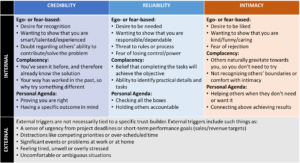The Strengths Trap: How Overplaying Your Strengths Harms Trust (Part I)
 Playing to our strengths can be seductive. We all want to feel we are presenting our best selves, and that naturally leads us to emphasize those things at which we excel. It’s often how we define our professional roles, our careers, even ourselves.
Playing to our strengths can be seductive. We all want to feel we are presenting our best selves, and that naturally leads us to emphasize those things at which we excel. It’s often how we define our professional roles, our careers, even ourselves.
Too Much of a Good Thing
Some modern psychometric tools are built around the idea that individuals are more successful and fulfilled when they focus on developing their strengths rather than trying to fix weaknesses. Gallup’s CliftonStrengths©, for example, claims that, by identifying and leveraging their strengths, individuals can “enhance their performance, engagement, and overall satisfaction in various aspects of their lives.”
That may be good advice in general. But is it possible to rely too much on our strengths?
When we’re talking about building trust, the answer is a clear, “Yes.”
More Is Not Always Better
Over-emphasizing or relying too heavily on a single factor to build trust can become a liability. To understand why, we need to explore the relationship of each trust-building variable with self-orientation.
In the Trust Equation (source: The Trusted Advisor by Maister, Green, and Galford, The Free Press, 2000), the factors in the numerator (Credibility, Reliability and Intimacy) build trust, while the single factor in the denominator (Self-Orientation) inhibits or diminishes trust.

In this equation, when numerator – the sum of the factors that build trust – increases and the denominator is constant or decreases, trustworthiness goes up.
It’s when we start to separate out the factors in the numerator that we can identify the risk. Although the Trust Equation is a heuristic and not a strict mathematical formula, we could rewrite the equation as the sum of each numerator over the single denominator:

Simple common sense tells us that relying too heavily on a trust-building strength can backfire, with consequences for our own behavior and how others may perceive us:
- Over-playing Credibility can lead to intellectual rigidity; others may perceive you as arrogant or closed-minded.
- Over-playing Reliability can lead to overcontrolling; others may perceive you as domineering or overly-focused on details.
- Over-playing Intimacy can lead to emotional exhaustion or appeasement; others may perceive you as intrusive or, at the other extreme, lacking ambition.
Why It Happens
It would seem that increasing each of the elements in the numerator would increase trust. But that only works if we lower or keep constant the denominator, self-orientation. The more we focus on our strength, the more our self-orientation increases, which diminishes the trust we are working to build.
Remember that when we have something that works well for us, it’s natural to fall back on that strength. When we’re under pressure, whether internal or external, it triggers an increase in self-orientation, which heightens the instinct to flex our strength.
The table below lists some likely internal triggers for each trust-building factor; the external factors are potential triggers regardless of the trust-building strength. The internal triggers typically fall into three categories: fear- or ego-based (concern about what they think about you), complacency (over-confidence in your strength), or achieving your agenda (getting what you want from the situation).

Common Triggers of High Self-Orientation
Self-Awareness: The Antidote to Self-Orientation
The presence of any of these triggers should be a warning sign that self-orientation might be on the rise. Once you recognize that a trigger is present, you can take action to lower your self-orientation to build trust, or at least to avoid diminishing it.
In Part II, we’ll explore what actions you can take to avoid over-playing your strengths.
Resources to Build Your Trust Skills:
- Join or watch a replay of our free webinars.
- Build trust on your terms through our Self-Paced Online Courses.
- Join the crowd and sign up for one of our Public Virtual Workshops.
- Subscribe to our newsletter.
- Follow us on LinkedIn.
- Contact us directly to learn about private workshops.

Trackbacks & Pingbacks
[…] The Strengths Trap: How Overplaying Your Strengths Harms Trust (Part II) […]
Leave a Reply
Want to join the discussion?Feel free to contribute!